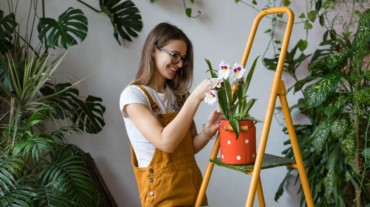
Haven’t we seen several people spending hours gardening? They lovingly nourish plants like their babies, giving them all the TLC they need. Of course, there are many who’d argue that gardening doesn’t interest them or they don’t have ‘green fingers’, but guess what? This activity, which may be fun or not, possesses great benefits for your physical and emotional well-being. Yes, you heard it right. When you dig, lift, prune, weed, water, harvest and more, you feel a sense of joy and contentment.
According to research, there is a practice in Japan called forest bathing, where people step out in green areas, just to recharge themselves. And while you may think that there really is no link, the fact is there is. Studies have shown that being amid plants can help you disconnect from distractions, making you more mindful of your immediate surroundings. That happens even in the case of gardening! The attention to detail is important, and hence, you have no choice but to focus. In this manner, you aren’t just building your concentration, but being mindful in every way possible.
Also read: Gardening is helping me survive this pandemic. Here’s how it can help you out too
We all love having plants around us for that breath of fresh air and vitality! But they are just not about beautifying your space. As mentioned above, they calm your mind and promote mindfulness to cope with stress and anxiety. Oh, and there’s proof to show this! According to a study published in the Journal of Physiological Anthropology, those who practise gardening feel more calm and relaxed than those who engage in other screen-based activities.

You might wonder what the relation is, but we are here to tell you. Of course, if you have different plants at home, each one has a different need. That means you might have to give more attention to one than the other, or move around, give them light or anything else. That means without even realising, you are on your toes. And we all know the more we move, the better we feel. So, hello endorphins!
Some people might think getting their hands dirty is the worst idea possible, but it is exactly this that will help your mental health. How? The mycobacterium found in the soil can improve brain function, and at the same time, help to boost your mood. That’s because this bacteria helps to increase the production of serotonin in the brain. And that means happiness is not out of reach.
Research shows that humans love to be a part of nature, and while we live in establishments where there is an overload of concrete, plants help us stay connected to who we really are. It is believed that plants mimic who we are. Plus, if you love yourself and are particular about self-care, your plants will catch on to the vibe, and flourish. Just to see your plants survive and thrive is gratifying!
